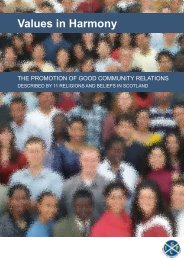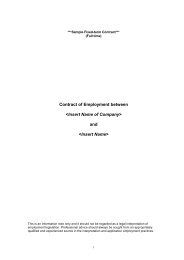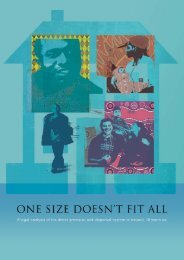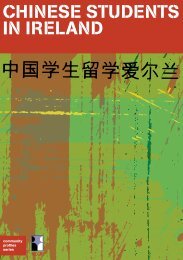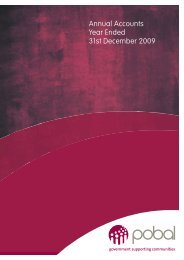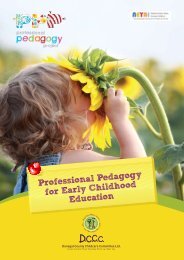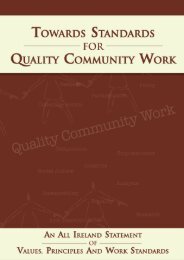Intercultural Education in the Post-Primary School - National Council ...
Intercultural Education in the Post-Primary School - National Council ...
Intercultural Education in the Post-Primary School - National Council ...
Create successful ePaper yourself
Turn your PDF publications into a flip-book with our unique Google optimized e-Paper software.
4. Correct mis<strong>in</strong>formationOne important role for <strong>the</strong> teacherdur<strong>in</strong>g a discussion on a controversialissue is to gently correctmis<strong>in</strong>formation. Keep this <strong>in</strong>formationsimple and to <strong>the</strong> po<strong>in</strong>t. Avoid enter<strong>in</strong>g<strong>in</strong>to confrontation or adopt<strong>in</strong>g anargumentative stance with a student orgroup of students.5. Emphasise that conflicts areopportunitiesMost controversial issues can generateconflict, and a discussion aboutcontroversial issues is a good time torem<strong>in</strong>d children that conflicts areopportunities for learn<strong>in</strong>g and growth.6. Show your humanityAdmit doubts, difficulties, andweaknesses <strong>in</strong> your own position.Allow <strong>the</strong> students to question yourposition too.7. Establish a means of closureEnsure that <strong>the</strong> discussion is brought toclosure with due sensitivity to <strong>the</strong>feel<strong>in</strong>gs that may have been aroused.EMPATHETIC LISTENINGListen<strong>in</strong>g lies at <strong>the</strong> heart of educationfor respect and mutual understand<strong>in</strong>g.Without listen<strong>in</strong>g it is not possible to enterano<strong>the</strong>r person’s world and hear <strong>the</strong>irstory. Empa<strong>the</strong>tic listen<strong>in</strong>g means listen<strong>in</strong>gwith <strong>the</strong> <strong>in</strong>tent to understand. This is askill that can be fostered amongst students(see exemplars on <strong>the</strong> web at www.ncca.ie)and also one that can be modelled by<strong>the</strong> teacher.CHECK LIST TO SEE IF I AM A GOODLISTENING ROLE MODELDo I really care about each student<strong>in</strong> my class?Can I f<strong>in</strong>d someth<strong>in</strong>g good to sayabout each student?Do I speak respectfully to each<strong>in</strong>dividual?Do I let students f<strong>in</strong>ish what <strong>the</strong>y aretry<strong>in</strong>g to say, and if <strong>the</strong>y hesitate,do I encourage <strong>the</strong>m to go on?Do I withhold judgement until <strong>the</strong>person has f<strong>in</strong>ished speak<strong>in</strong>g?Am I able to avoid confrontation?Do I express understand<strong>in</strong>g and empathy,as appropriate?Do I regularly give positive feedback toeach pupil?Do I assume certa<strong>in</strong> pupils are guiltybefore listen<strong>in</strong>g to <strong>the</strong> facts?Am I able to apologise when I treat astudent unfairly?Is my body language consistent withmy words?For example, do I ask <strong>the</strong>m how <strong>the</strong>y aregett<strong>in</strong>g on and look poised to rush off?Adapted from Quality Circle Time <strong>in</strong><strong>the</strong> Secondary <strong>School</strong> – A Handbook ofGood Practice by Jenny Mosley andMarilyn Tew, David Fulton Publishers,London, 1999.86<strong>Intercultural</strong> <strong>Education</strong> <strong>in</strong> <strong>the</strong> <strong>Post</strong>-<strong>Primary</strong> <strong>School</strong>




